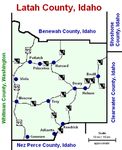2021 VITALITY REPORT - Partnership for Economic Prosperity
←
→
Page content transcription
If your browser does not render page correctly, please read the page content below
2021 Latah County Region Vitality Report
2021 VITALITY REPORT
The Partnership for Economic Prosperity, or PEP, works as catalyst for enterprise and eco-
nomic growth, a conduit for information and opportunity, an advocate for future eco-
nomic expansion, and most importantly, having a single unified voice supporting prosperi-
ty throughout all Latah County always focused on common outcomes.
The past year was an uncertain and unsettled time in our
region, but one of subtle underlying optimism. Vaccines
are on the way, and 2021 brings hope for a return to some
degree of normalcy. For the purposes of this report, data
will utilize 2019 data as a reference point, and we will show
the past 12 months progress.
Beautiful Latah County is located in the panhandle of
northern Idaho, and is home to approximately 40,000 peo-
ple. In spite of the global uncertainty, in 2020, the county
population grew by 1638 people.
2672 businesses call Latah County home, 85% built with 20 or less employees. In 2019, these
businesses posted 9275 unique jobs while in 2020, only 7302 postings were made, illustrating
a more cautious business climate.
12021 Latah County Region Vitality Report
Latah County industries are shown below, and even with the pandemic pressure, with the
exception of Retail Trade, industry growth was minimal from 2019 to 2020.
Latah County’s workforce is broken
down rather evenly by gender, with
the majority of the workforce between
25 years and 55 years of age. Since
2014, job growth has increased 5.7%,
but this falls short of the national
growth rate of 6.9%. While the number
of jobs increased, the labor force par-
ticipation rate has decreased from
58.3% to 56.2%.
The mobility of workforce in Lat-
ah County is shown in the
graph to the right, net move-
ment out of and into the
Palouse region.
Due to the transitory nature of
part of the population, housing
becomes a critical issue.
Housing in the Palouse region (Latah and Whitman counties) has become a critical con-
cern for cities as the demand for housing—both single and multifamily, condominiums and
townhouses far exceeds the supply. The largest cities, Moscow, Id, and Pullman Wa. share a
workforce, and with that in mind, PEP established the Regional Housing Leadership Team to
address housing. Comprised of developers, city planners, realtors, and business owners, the
cross-border group aims to identify and remove barriers to additional housing in the region.
City Number of Sales Average Sales Price % Change from 2019 Days on Market
Moscow 299 $351,221 12.4% 27
Viola 7 $379,142 -1.7% 78
Troy 22 $290,961 -6.5% 41
Deary 24 $337,883 22.4% 37
Genesee 29 $274,841 5.5% 59
Potlatch 32 $297,180 26.2% 33
Kendrick/Juliaetta 28 $260,965 13.4% 67
Bovill 4 $181,975 70.1% 75
Elk River 4 $118,625 -1.1% 134
22021 Latah County Region Vitality Report
As the pandemic grew, the citizens of Latah County began living and working remotely.
Broadband connectivity became a lifeline for families throughout the county, and broad-
band became the backbone for everything from retail and entertainment to education.
PEP in close conjunction with Latah County officials, has started development of a county-
wide plan for wireless broadband access points in each small community—working to in-
crease access for bridging the digital divide and increase access for students. As the fed-
eral government begins to release funding for nationwide broadband, Latah County will
be well prepared to implement the infrastructure needed to help our citizens, support our
businesses and market our county as well.
Idaho Department of Commerce has surveyed broadband access throughout the state
shown below:
many ways, economic development is centered around the individual cities in the re-
gion, but to the outside world, the quad-city region is what interests site selectors . The
Palouse region, Moscow and Lewiston Idaho and Pullman and Clarkston Washington of-
fer a educated diverse workforce, ample developable land, solid infrastructure, and low
cost of cost of living compared to larger metropolitan areas.
A comparison of the cities in the Palouse is shown below.
Latah Whitman Nez Perce Asotin
Population 2019 40,124 49,769 40,409 22,610
Population 2020 40,424 50,315 40,568 22,717
Population Change % .69% .83% .85% .47%
COL Index 101.1 113.7 101.1 117.6
Unemployment Rate 3.8% 5.2% 4.5% 4.6%
(July 2020)
Median Household In- $45,466 $42,163 $54,174 $50,423
come
32021 Latah County Region Vitality Report
PEP believes that supporting Latah county can be divided into four major categories:
Community Outreach, Business Support meetings, University of Idaho support, and site
visits for business recruitment and retention efforts.
Latah 411 is PEP’s podcast aimed at
highlighting all the business gems of
Latah County. From Coffee
roasters, clothing boutiques, dance
studios, personal coaches, and
more—Latah County has it all!
Contact PEP if you’d like to see your
business on the podcast
PEP Board of Directors
Dan Ewart— President
Paul Kimmell—Vice President
Gary J. Riedner—Secretary/Treasurer
TALKS
PEP Talks will be introducing a new
Kathie La Fortune—Director segment called “The More You Know
Samantha Martinet—Director Latah.” This segment will have the same
valuable information found at PEP Talks,
but will be featured on PEP’s podcast
Gina Taruscio—Executive Director channel. The topics will range from
Alisha Merriman—Research Analyst Water to Housing to Broadband. Be on
the lookout in the near future for this
new installment.
Website: www.pepedo.org
4You can also read






















































